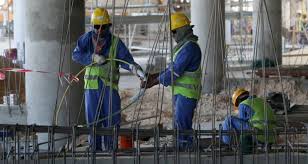By Samindra Kunti in Doha
December 13 – Once among the most vocal critics of labour conditions in the host country of the 2022 World Cup, European football associations have generally failed in their promises to follow up on the legacy of the tournament in Qatar.
Human rights and labour rights came into sharp focus in the protracted build-up to the first global finals in the Middle East, with European associations raising concerns about the plight migrant workers faced in Doha in building the infrastructure for the tournament. But a year on from the World Cup, few national football bodies have shown any concern for the situation of migrant workers and labour developments in Qatar.
“There have been a few football associations that we’ve engaged with over the past year, certainly, not all. The interest of football associations varies very much. Post-World Cup, there have been only a few that we’ve had,” said Max Tunon, the head of the International Labour Organisation (ILO) office in Doha.
“The Dutch have been here in Qatar after the World Cup. The Norwegians and the Danish. A follow-up call from the German football association asking what’s the latest and all that. So, there is some remaining interest from some of the football associations.”
Last month, the Norwegian FA (NFF) president Lise Klaveness travelled to Doha, together with the Danish FA, to follow up on the much-trumpeted labour reforms. Away from the official circuit, the NFF president also met with migrant workers.
Klaveness rose to global acclaim at the FIFA Congress last year in Doha where she raised the issues of human rights and the LGBT-community in Qatar, much to the dismay of FIFA and host nation Qatar, who have claimed repeatedly that the kafala system has been abolished. Earlier this year, the Dutch Fa (KNVB) also returned to Doha to follow up.
But the Norwegians and the Dutch are among the exceptions. The English FA has not travelled to the Qatari capital. The Belgian FA did, but only to lobby in the race for the 2027 Women’s World Cup. The UEFA Working Group on Human Rights has remained silent as well in 2023.
FIFA has promised to deliver a report on the legacy of the finals through its Sub-Committee on Human Rights and Social Responsibility, chaired by Gibraltar FA president Michael Llamas. The makeup of the sub-committee, populated with members of FIFA’s Governance, Audit and Compliance Committee, however points to a lack of human rights expertise. In the past, FIFA boss Gianni Infantino has said that migrant workers gain great pride from hard work.
Contact the writer of this story at moc.l1714142727labto1714142727ofdlr1714142727owedi1714142727sni@i1714142727tnuk.1714142727ardni1714142727mas1714142727

